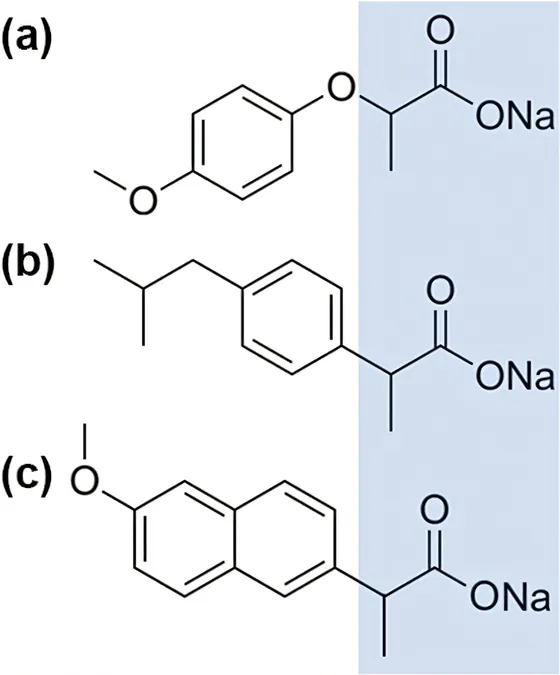
Shocking Discovery: Ibuprofen May Reduce Sweet Taste Perception and Combat Metabolic Diseases!
2025-03-25
Author: Arjun
Groundbreaking Study Unveiled
In a groundbreaking study published in the British Journal of Pharmacology, researchers from the Monell Chemical Senses Center and Rutgers University have unveiled that ibuprofen, a common anti-inflammatory medication, can inhibit sweet taste perception and impact glucose detection in humans. This revelation could open the door to new strategies for reducing the risk of metabolic diseases.
The Role of Sweet Taste Receptors
The human sweet taste receptor, responsible for detecting sugars, plays a critical role in not only our taste perception but also in regulating glucose metabolism throughout the body. Interestingly, ibuprofen and its counterpart naproxen share structural similarities with substances that inhibit this sweet taste receptor, leading scientists to investigate their potential metabolic benefits.
Research Findings
Dr. Paul AS Breslin, the senior author of the study, explained, “We found that ibuprofen and naproxen inhibit the activation of the sweet taste receptor, TAS1R2-TAS1R3, both in human subjects and in cell studies. This effect suggests that these medications could help modulate glucose metabolism by dampening the perception of sweetness.”
In their series of laboratory experiments, the researchers observed that ibuprofen significantly reduced the molecular signaling associated with sugar detection in human kidney cells engineered to express the sweet taste receptor. Alarmingly, low doses of ibuprofen—approximately the level found in human plasma after a normal dosage—were effective in inhibiting sweet taste and glucose detection, even at levels comparable to post-meal blood sugar surges.
Long-term Implications
But this study goes deeper! Long-term use of ibuprofen has been linked to preserved metabolic function and a lowered risk of diseases such as Alzheimer's, diabetes, and colon cancer. The implications are staggering: patients who regularly take ibuprofen might experience a noteworthy reduction in blood sugar levels, potentially altering the course of Type 2 diabetes management.
Chronic Usage and Metabolic Health
Breslin elucidated, “In our human experiments, participants who rinsed their mouths with ibuprofen demonstrated diminished sweetness from various sugars and sweeteners. The correlation between chronic ibuprofen usage and reduced risk of metabolic diseases is becoming increasingly evident.”
Role of TAS1R Receptors
The researchers also emphasize the role of the TAS1R receptors in glucose metabolism. “We contend that ibuprofen is more than just an anti-inflammatory agent; it actively inhibits the TAS1R2-TAS1R3 receptor, which is present in many metabolic regulatory tissues and organs. Previous studies indicate that targeting these receptors can lead to significant changes in metabolism,” Breslin noted.
Future Directions
As the scientific community processes these findings, one thing is clear: manipulating taste receptors could be a pivotal strategy in addressing inflammatory and metabolic diseases like Alzheimer's disease and diabetes. A paradigm shift may be on the horizon, revealing the significant links between taste perception and metabolic health!
Conclusion
For health enthusiasts and those at risk of metabolic diseases, this research underscores the importance of further exploration into how common medications like ibuprofen can influence not just pain relief but also overall metabolic health. Could this lead to revolutionary dietary and pharmacological treatments in the future? Stay tuned!



 Brasil (PT)
Brasil (PT)
 Canada (EN)
Canada (EN)
 Chile (ES)
Chile (ES)
 Česko (CS)
Česko (CS)
 대한민국 (KO)
대한민국 (KO)
 España (ES)
España (ES)
 France (FR)
France (FR)
 Hong Kong (EN)
Hong Kong (EN)
 Italia (IT)
Italia (IT)
 日本 (JA)
日本 (JA)
 Magyarország (HU)
Magyarország (HU)
 Norge (NO)
Norge (NO)
 Polska (PL)
Polska (PL)
 Schweiz (DE)
Schweiz (DE)
 Singapore (EN)
Singapore (EN)
 Sverige (SV)
Sverige (SV)
 Suomi (FI)
Suomi (FI)
 Türkiye (TR)
Türkiye (TR)
 الإمارات العربية المتحدة (AR)
الإمارات العربية المتحدة (AR)